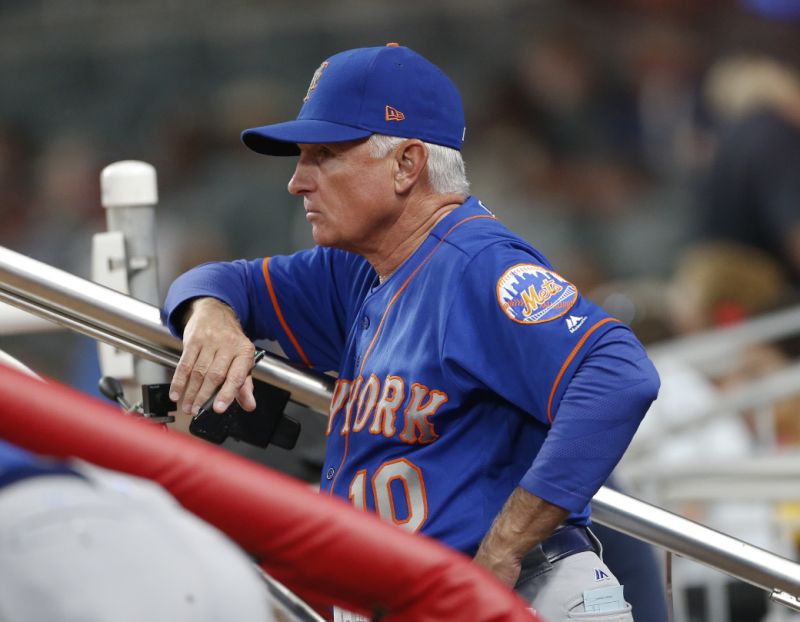|
These are the last few days for Terry Collins to manage the Mets.
He deserves the release, for good behavior. Collins has served seven years, longer than any other Met manager, and he has upheld the grand tradition of gray-haired, hands-in-back-pocket managers. The skipper. Now he is 68 and his contract is up and as a writer-turned-fan I want to tell him, “Thanks, man.” The end of a baseball season is always a gloomy time for fans of most teams, but I suspect a lot of Mets fans are particularly gloomy because we know it wasn’t Collins’ fault that the Mets fell apart this year. For seven years, his players never exhibited smirks or shrugs, always hustled and seemed to respect what Keith Hernandez calls “the fundies” – fundamentals. The Mets won a pennant nobody expected. Collins, a stranger to New York, was a throwback to the grand old baseball tradition of “dandy little manager” -- usually a middle infielder of marginal skills who had learned by observing. In my childhood, writers called Leo Durocher “the dandy little manager” but Leo the Lip was too much of a braggart and popinjay to fit in with the commonfolk. I grew up with dugout “hold-‘em-while-I-think-of-something” savants like Charlie Dressen of the old Brooklyn Dodgers – short on grammar and school learning and long on experience – and moving on to Sparky Anderson and Jim Leyland, guys who loved and respected the game, because it came hard to them as players. Gene Mauch wanted to come off as cerebral. Joe Maddon -- Collins’ protégé -- is a bit more educated and worldly and fun. Earl Weaver was brash and hid his knowledge well. Buck Showalter is a control-freak lifer. Skippers. New Yorkers had no reason to know Collins, whose temper had touched off a player mutiny in his wreck of a time with the Angels. But Collins worked in development with the Dodgers, and was a surprise managerial pick by Sandy Alderson. Not that I have been around the team much lately (having retired at the end of 2011) but Collins’ responses in the televised post-game interview were funny and enlightening. He stuck up for his players but did not try to sugar-coat their mistakes. He used current tools but did not make me nuts with blather about all those new computer-driven statistics. Collins had the class to own the most ruinous decision he made -- staying with Johan Santana as he completed the first no-hitter in Mets’ history, but blowing his arm out, terminally. Collins always referred to Santana when asked why he observed pitch counts for young pitchers, who have mostly fallen apart anyway. When Alderson gave him some players, Collins guided the team to the World Series. It has not been fun for a fan, watching it all fall apart this year. I give credit to the professionals who never quit – Curtis Granderson and Jay Bruce and Neil Walker and Rene Rivera, who had value elsewhere. When Collins finally pulled Asdrubal Cabrera from shortstop, Cabrera complained but never stopped playing hurt and being a good teammate. Jose Reyes accepted his backup role and worked with Amed Rosario like a big brother teaching the kid who had taken playing time from him. Now the Mets management should let Collins retire gracefully – retain him as a development guy who can coach and teach – and move on to a younger manager. Collins deserves to be remembered with Casey Stengel, Gil Hodges, Davey Johnson and Bobby Valentine, other epic managers in the Mets’ amazin’ history. As Casey would have said, “He done splendid.”
George Vecsey
9/27/2017 10:47:09 am
Wow, Harry, thanks so much. It's great to hear from you. We go back to, what, 77-78? Let me know what you are doing. My personal email is: 9/27/2017 04:16:05 pm
Simply put, George: beautiful. It's a shame that Terry has to go out this way, but he's a smart and grounded individual, who has a lot to look forward to, hopefully with some role, as you suggest, in the Mets org. Thank you for putting to words what I've been thinking. LGM, Peter
Altenir Silva
9/27/2017 05:32:13 pm
Dear George,
bruce
9/27/2017 05:55:45 pm
george,
George
9/27/2017 07:10:57 pm
Thanks to all. Bruce, i think Collins was there briefly. Bobby V absorbed the culture but did not hesitate to critique. Domo....GV
bruce
9/27/2017 09:12:31 pm
george,
George Vecsey
9/28/2017 07:38:05 am
Bruce, correct, he left in May of second year. GV
Ed Martin
9/30/2017 08:34:24 pm
Your column "speaks my mind" as Quakers say. I was thinking of Joe Maddox, as well. Collins is a class act.
Alan D. Levine
10/22/2017 02:31:04 pm
I would look at Terry's face during games this past season and wonder how he could stand his job any longer. And why won't the Flushing Brain Trust consider Dusty Baker now that he has inexplicably become available? Comments are closed.
|
Categories
All
|










